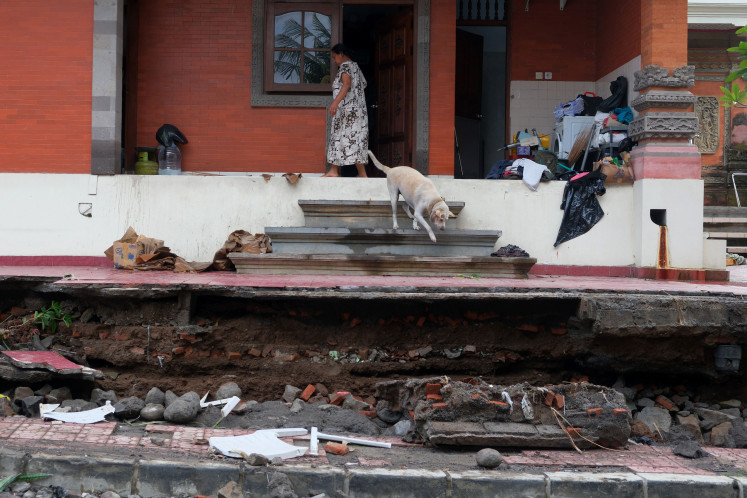Popular Reads
Top Results
Can't find what you're looking for?
View all search resultsPopular Reads
Top Results
Can't find what you're looking for?
View all search resultsSBY: Global growth of middle class has democratic imperative
Fairly democratic: President Susilo Bambang Yudhoyono (left), accompanied by former Canadian prime minister Kim Campbell (right), arrives at Jakarta’s Shangri-La Hotel to open the 6th Assembly of the World Movement for Democracy
Change text size
Gift Premium Articles
to Anyone
F
span class="caption">Fairly democratic: President Susilo Bambang Yudhoyono (left), accompanied by former Canadian prime minister Kim Campbell (right), arrives at Jakarta’s Shangri-La Hotel to open the 6th Assembly of the World Movement for Democracy. The two-day forum is being attended by hundreds of democracy activists and representatives from many countries. Antara/Widodo S. Jusuf
Every country in the world has to embrace democracy to survive because of demands from the growing number of middle class citizens and inevitable influence of globalization, President Susilo Bambang Yudhoyono says.
Opening the sixth symposium of the World Movement for Democracy (WMD), in Jakarta on Monday, Yu-dhoyono said every political system in the world had to take into account the spread of globalization and the growth of the middle class because both were drivers toward democracy.
“Regardless of what political model you embrace, I have no doubt that in our time our future belongs to those who are willing to responsibly embrace pluralism, openness and freedom. Your choice is to act and survive, or to resist and crumble.”
“We see a stronger desire for democracy in the 21st century than we did in the 20th century. This is because of the powerful globalization, bringing with it greater connectivity in goods, people and services.”
“The middle class will continue to grow and in the first time in the 20th century, more than half of the world population is loosely middle class. As they grow in strength and confidence, sooner or later they desire to seek greater transparency and accountability in decisions that affect their lives. No political system can ignore this.”
Jakarta, now the third-largest democracy in the world, experienced a social uprising in 1998 that led to the ousting of then president Soeharto, who had maintained authoritarian rule for 32 years.
Yudhoyono said the challenges for democracy in Indonesia rested in vote buying, which had created an artificial democracy.
The symposium brings together around 600 participants from 110 countries including Myanmar and Cuba, to share experiences and knowledge surrounding democratization.
The symposium featured Malaysia’s opposition party leader Anwar Ibrahim, former Canadian prime minister Kim Campbell and prominent activists from Egypt, Zimbabwe, Myanmar and several other countries.
In her speech on Monday, Campbell said Jakarta had been a leading model for democracy that had inspired similar movements elsewhere.
Carl Gershman, a member of WMD and president of the Washington-based National Endowment for Democracy, said Yudhoyono delivered a strong message to the forum and the world that Jakarta would continue to support and look into spearheading democracy enforcement in the region, through diplomacy.
“We are looking so much for Yudhoyono to play a role in bringing a change in Myanmar because he has the capability for this. His military background and experience in Jakarta in its political reform would support that mission,” Carl said in an interview.
While military generals have remained influential in Indonesia, the 1998 reform movement resulted in the military reform that stripped generals and the military of political engagement in the House of Representatives.
Later, the police was also separated from the military in an effort to give the law enforcement institution a civilian face.
Meanwhile, Myanmar will have its first elections in two decades but the military government has skewed the electoral regulations to prevent opposition leader Aung San Suu Kyi from running for office.










